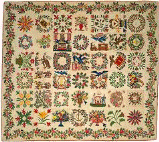Textile Society of America

Textile Society of America: Symposium Proceedings
Date of this Version
2002
Document Type
Article
Citation
Silk Roads, Other Roads: Proceedings of the 8th Biennial Symposium of the Textile Society of America, September 26-28, 2002, Northampton, Massachusetts
Abstract
My aim in this paper is to explore the kinds of strategies used to market a contemporary needlework project in South Africa – one entitled “Mapula” (which means “mother of rain”). Members of Mapula embroider cushion covers and, more occasionally, tablemats. But the art form that has been especially successful and provided members of the project with the widest scope for innovation is embroidered cloths – works that were first made in 1996.
The Formation of Mapula
While currently operating in a post-apartheid South Africa, Mapula was in fact formed in 1991, three years prior to the first democratic election in 1994. The project is in the Winterveld (Fig.1) – an area that is currently in the North West Province and about 45 km north of Pretoria. In 1936, large farms comprising the Winterveld were divided into plots that were made available for purchase and agricultural development by black South Africans. But rather than undertaking farming, new owners found it more profitable to rent land to tenants on the lookout for homesteads a manageable distance from Pretoria and Johannesburg. Growth in the population increased still further when the area became home to victims of the forced removals that took place during the fifties and sixties – in other words, when thousands of black families were evicted from suburbs identified for white settlement. The Winterveld would also feel the impact of the apartheid government’s policy of dividing areas of the country occupied by black people into independent ‘homelands’. Although 90% of the population are not Tswana-speakers, the area was incorporated into the ostensibly Tswana ‘homeland’ of Bophuthatswana when it was granted independence in December 1977. When assigned to Bophuthatswana, the already dire living conditions of the population worsened. Boreholes that had been drilled by the South African government in an attempt to create a fresh water supply for the burgeoning population were neglected, disease and infant mortality became rife, and, when all registered schools were required to use Tswana as their medium of instruction, so-called ‘private schools’ were established that were often no more than shacks staffed by teachers with limited levels of literacy. Also non-Tswana people living in the area, even those who had been born in the Winterveld or who had inherited land, had difficulties obtaining citizenship of Bophuthatswana and, as a result, struggled to receive pensions or work permits. This was, then, an area rife with social problems.
The formation of Mapula was part of an initiative by the professional women’s organisation, Soroptomists International, to upgrade the living conditions of people in the Winterveld. A prime mover in starting the project was Karin Skawran, then professor and head of History of Art and Fine Art at the University of South Africa (Unisa) in Pretoria and a Soroptomist whose portfolio was “Literacy and Education”. Equally important were the Sisters of Mercy in the Winterveld. In early 1979, a Winterveld Action Committee was established under the auspices of the Pretoria Council of Churches, and one of its agendas was the introduction of literacy and development projects in the area. This provided a framework for the Sisters of Mercy to build an adult education centre in the Winterveld, one that opened in 1984 and was named the DWT Nthathe Adult Education Centre. Apart from making available a room at the school as a base for the project, the Sisters identified Emily Maluleke as a local person who could supervise the making of works. A number of University of South Africa staff assisted the project in its early stages. But the person whose commitment has been the most sustained has been Janétje van der Merwe – a fine art graduate employed by the Department of Marketing and Corporate Communication.


Comments
Copyright 2002 by the author.